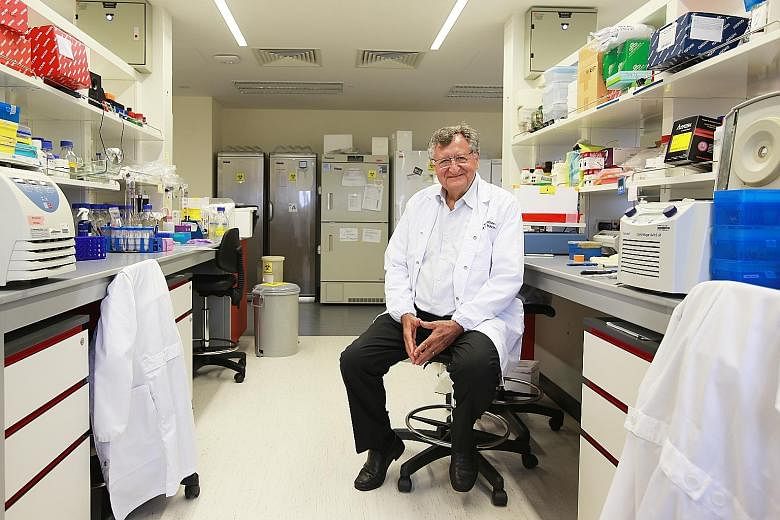Fatty liver disease used to be a problem of middle-aged alcoholics, but some lean people who drink little or no alcohol are also developing the condition.
Non-alcoholic fatty liver disease predisposes patients to more severe illnesses, such as liver cancer or liver cirrhosis, which refers to the hardening and shrinkage of the organ.
To treat it, doctors usually recommend that patients make lifestyle changes, such as getting enough exercise, losing weight and keeping to a diet which restricts overall carbohydrate intake, so as to regulate the lipid (fat) levels in the blood.
"Medications are not usually the first-line treatment for fatty liver disease," said Dr Victor Lee, general surgeon at Gleneagles Hospital Singapore.
But new research from Nanyang Technological University's (NTU) Lee Kong Chian School of Medicine may pave the way for better treatment of non-alcoholic fatty liver disease and its complications.
The university's scientists have identified a protein in the liver that promotes the absorption and breakdown of lipids.
If a drug could be developed to stimulate this protein in the liver, it could be another way for non-alcoholic fatty liver disease to be treated.
The research, led by Professor Walter Wahli, is still in its early days.
But pharmaceutical companies could conduct further studies to determine if novel drugs could be developed to stimulate the activity of the protein in specific parts of the body, like the liver.
A protein in the body, known as peroxisome proliferator-activated receptors (PPAR)-alpha, is responsible for breaking down lipids.
It can be found in tissues that efficiently break down lipids, such as the muscles, the liver and kidneys.
But for patients with non-alcoholic fatty liver disease, PPAR-alpha in the liver cells may be less efficient in taking in lipids and breaking them down, causing fat to accumulate in the liver.
Fatty liver disease occurs when fat molecules, or lipids, accumulate inside liver cells, called hepatocytes.
Prof Wahli and his team had the hypothesis that patients with non-alcoholic fatty liver disease may have suppressed PPAR-alpha activity only in the liver, and not the rest of the body.
So he worked with scientists from France to develop a mouse model which lacked PPAR-alpha specifically in the liver.
They compared these mice with two other models: mice which lacked PPAR-alpha in their entire bodies, and normal mice which served as the control group.
All three were fed the same type and amount of food for about a year. After 51 weeks, mice which lacked PPAR-alpha in their entire bodies grew obese, weighing almost 50g, and developed fatty liver disease.
In comparison, mice without PPAR-alpha specifically in their livers weighed about 37g, similar to the control mice. However, they also developed fatty liver disease.
Prof Wahli said: "We didn't know what the role of PPAR-alpha in the liver was in the development of fatty liver disease.''
The research was published in February this year in the science journal Gut.
The findings, besides encouraging new drugs to be developed for the problem, could also pave the way for better use of existing medication, like fenofibrate, which stimulates PPAR-alpha activity, Prof Wahli added.
It is now used to treat patients with high levels of triglycerides, a type of fat.
Dr Ling Khoon Lin, a gastroenterologist at Mount Elizabeth Hospital, said Prof Wahli's paper is important as it demonstrates the role of liver PPAR-alpha in causing non-alcoholic fatty liver disease.
"It gives scientific support for further research into the role of PPARs in (the disease) and for their potential use as treatment for non-alcoholic fatty liver disease," he said.
Associate Professor Dan Yock Young, senior consultant at the National University Hospital's division of gastroenterology and hepatology, said the precise relationship between non-alcoholic fatty liver, obesity, cholesterol and triglycerides is still not quite clear despite advances in this field of metabolic disease.
But Prof Wahli's paper had shed light on how PPAR-alpha is an integral player in defective lipid processing in the liver.
"This goes some way in unravelling the complexity of how and why fatty liver develops and potentially opens new targets for new drugs," Prof Dan added.


